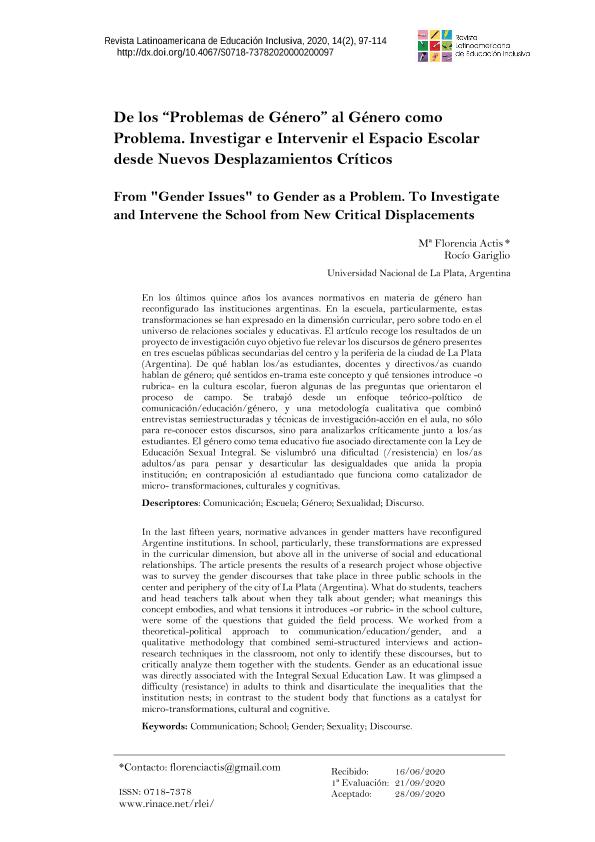Artículo
En los últimos quince años los avances normativos en materia de género han reconfigurado las instituciones argentinas. En la escuela, particularmente, estas transformaciones se han expresado en la dimensión curricular, pero sobre todo en el universo de relaciones sociales y educativas. El artículo recoge los resultados de un proyecto de investigación cuyo objetivo fue relevar los discursos de género presentes en tres escuelas públicas secundarias del centro y la periferia de la ciudad de La Plata (Argentina). De qué hablan los/as estudiantes, docentes y directivos/as cuando hablan de género; qué sentidos en-trama este concepto y qué tensiones introduce -o rubrica- en la cultura escolar, fueron algunas de las preguntas que orientaron el proceso de campo. Se trabajó desde un enfoque teórico-político de comunicación/educación/género, y una metodología cualitativa que combinó entrevistas semiestructuradas y técnicas de investigación-acción en el aula, no sólo para re-conocer estos discursos, sino para analizarlos críticamente junto a los/as estudiantes.El género como tema educativo fue asociado directamente con la Ley de Educación Sexual Integral. Se vislumbró una dificultad (/resistencia) en los/as adultos/as para pensar y desarticular las desigualdades que anida la propia institución; en contraposición al estudiantado que funciona como catalizador de micro- transformaciones, culturales y cognitivas. In the last fifteen years, normative advances in gender matters have reconfigured Argentine institutions. In school, particularly, these transformations are expressed in the curricular dimension, but above all in the universe of social and educational relationships. The article presents the results of a research project whose objective was to survey the gender discourses that take place in three public schools in the center and periphery of the city of La Plata (Argentina). What do students, teachers and head teachers talk about when they talk about gender; what meanings this concept embodies, and what tensions it introduces -or rubric- in the school culture, were some of the questions that guided the field process. We worked from a theoretical-political approach to communication/education/gender, and a qualitative methodology that combined semi-structured interviews and actionresearch techniques in the classroom, not only to identify these discourses, but to critically analyze them together with the students. Gender as an educational issue was directly associated with the Integral Sexual Education Law. It was glimpsed a difficulty (resistance) in adults to think and disarticulate the inequalities that the institution nests; in contrast to the student body that functions as a catalyst for micro-transformations, cultural and cognitive.
De los ''problemas de género'' al género como problema: Investigar e intervenir el espacio escolar desde nuevos desplazamientos críticos
Título:
From "Gender Issues" to Gender as a Problem: To Investigate and Intervene the School from New Critical Displacements
Fecha de publicación:
12/2020
Editorial:
Red Iberoamericana de Investigación sobre Cambio y Eficacia Escolar
Revista:
Revista Latinoamericana de Educación Inclusiva
e-ISSN:
0718-7378
Idioma:
Español
Tipo de recurso:
Artículo publicado
Clasificación temática:
Resumen
Palabras clave:
COMUNICACIÓN
,
ESCUELA
,
GÉNERO
,
SEXUALIDAD
Archivos asociados
Licencia
Identificadores
Colecciones
Articulos(CCT - LA PLATA)
Articulos de CTRO.CIENTIFICO TECNOL.CONICET - LA PLATA
Articulos de CTRO.CIENTIFICO TECNOL.CONICET - LA PLATA
Citación
Actis, María Florencia; Gariglio, Rocio; De los ''problemas de género'' al género como problema: Investigar e intervenir el espacio escolar desde nuevos desplazamientos críticos; Red Iberoamericana de Investigación sobre Cambio y Eficacia Escolar; Revista Latinoamericana de Educación Inclusiva; 14; 2; 12-2020; 97-114
Compartir
Altmétricas




